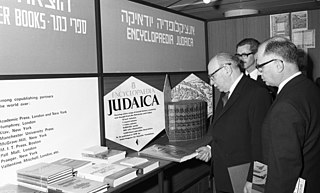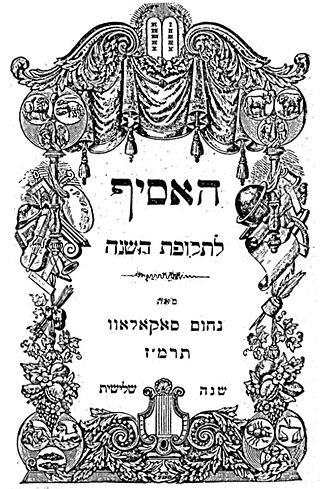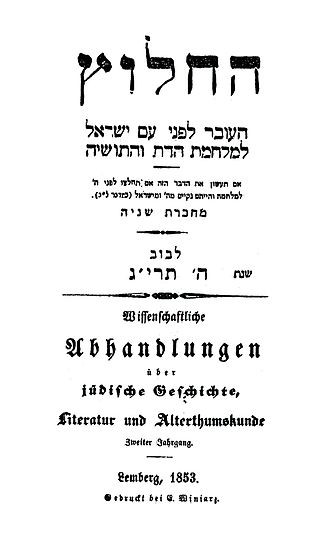
Simon ben Koseba or Cosiba, commonly known as Bar Kokhba, was a Jewish military leader who led the Bar Kokhba revolt against the Roman Empire in 132 CE. The revolt established a three-year-long independent Jewish state in which Bar Kokhba ruled as nasi ("prince"). Some of the rabbinic scholars in his time imagined him to be the long-expected Messiah. Bar Kokhba was killed by the Romans in the fortified town of Betar.

The Torah is the compilation of the first five books of the Hebrew Bible, namely the books of Genesis, Exodus, Leviticus, Numbers and Deuteronomy. It is known as the Pentateuch or the Five Books of Moses by Christians. It is also known as the Written Torah in Jewish tradition. If meant for liturgic purposes, it takes the form of a Torah scroll. If in bound book form, it is called Chumash, and is usually printed with the rabbinic commentaries.

Leopold Zunz was the founder of academic Judaic Studies, the critical investigation of Jewish literature, hymnology and ritual. Zunz's historical investigations and contemporary writings had an important influence on contemporary Judaism.
Shechinah, (Hebrew: שְׁכִינָה Šḥīnā, is the English transliteration of a Hebrew word meaning "dwelling" or "settling" and denotes the presence of God, as it were, in a place. This concept is found in Judaism.

The Encyclopaedia Judaica is a 22-volume English-language encyclopedia of the Jewish people, Judaism, and Israel. It covers diverse areas of the Jewish world and civilization, including Jewish history of all eras, culture, holidays, language, scripture, and religious teachings. First completed in 1971–1972, the encyclopedia had been published in two editions by 2010, accompanied by a few revisions.
Cecil Roth was a British Jewish historian. He was editor in chief of Encyclopaedia Judaica.

Judah Leib Gordon, also known as Leon Gordon, was among the most important Hebrew poets of the Jewish Enlightenment.

Micah Joseph Lebensohn (Hebrew: מיכה יוסף הכהן לעבענזאָהן, romanized: Mikhah Yosef ha-Kohen Lebenzohn;, also known by the pen name Mikhal, was one of the foremost poets and translators of the Haskalah in Vilna. He is best known for his innovative narrative Biblical romances and pantheistic nature poetry, influenced by the Romantic movement. These are characterised by "a deep pathos and a beauty of expression," and noted for their "expression of the young poet's strong longing for life and of the dread of an early dissolution which preyed on his mind."

Reuben Asher Braudes was a Lithuania-born Hebrew novelist and journalist.
Jewish commentaries on the Bible are biblical commentaries of the Hebrew Bible from a Jewish perspective. Translations into Aramaic and English, and some universally accepted Jewish commentaries with notes on their method of approach and also some modern translations into English with notes are listed.
The Disputation of Barcelona was a formal ordered medieval debate between representatives of Christianity and Judaism regarding whether or not Jesus was the Messiah. It was held at the royal palace of King James I of Aragon in the presence of the King, his court and many prominent ecclesiastical dignitaries and knights between Dominican Friar Pablo Christiani, a convert from Judaism to Christianity, and Nachmanides, a leading medieval Jewish scholar, philosopher, physician, kabbalist and biblical commentator.

Aaron Zeitlin was a Jewish American educator and writer. He authored several books on Yiddish literature, poetry and parapsychology.
Israel Aaron was an American rabbi and scholar. His father was a native of Hesse-Darmstadt, where he served many years in the army, holding several minor military offices. After leaving the High School Israel, Aaron entered the Hebrew Union College in Cincinnati. From 1883 to 1887, he was rabbi in Fort Wayne, Indiana, and since 1887 was a Rabbi in Buffalo, New York. He wrote on "The Relation of the Jews and Arabs to the Renaissance," and "The Megillah of Saragossa," in the "Menorah"; also translations of Franz Delitzsch's "Colors in the Talmud" and J. Stern's "Woman's Place in the Talmud."
Samuel Zvi Hirsh "Henryk" Peltyn was a Polish Jewish writer, translator, and publisher.

Yehoshua Ḥana Rawnitzki was a Hebrew publisher, editor, and collaborator of Hayim Nahman Bialik.
Rabbi Solomon Eger was an influential rabbi and successor of his father as the rabbi of Posen, then in Germany.
Harold Fisch, also known as Aharon Harel-Fisch, was a British-Israeli author, literary critic, translator, and diplomat. He was a Professor of English and Comparative literature at Bar-Ilan University, of which he served as Rector from 1968 to 1971. He was awarded the Israel Prize for Literature in 2000.

Judah Leib Ben-Ze'ev was a Galician Jewish philologist, lexicographer, and Biblical scholar. He was a member of the Me'assefim group of Hebrew writers, and a "forceful proponent of revitalizing the Hebrew language".

Ha-Asif was a Hebrew-language yearly journal, published in Warsaw by Naḥum Sokolow.

He-Ḥalutz was a Hebrew magazine which appeared irregularly between 1852 and 1889. It was edited and published by Joshua Heschel Schorr as the realization of a plan mapped out by his friend and teacher Isaac Erter, who had died one year before the first volume appeared.











